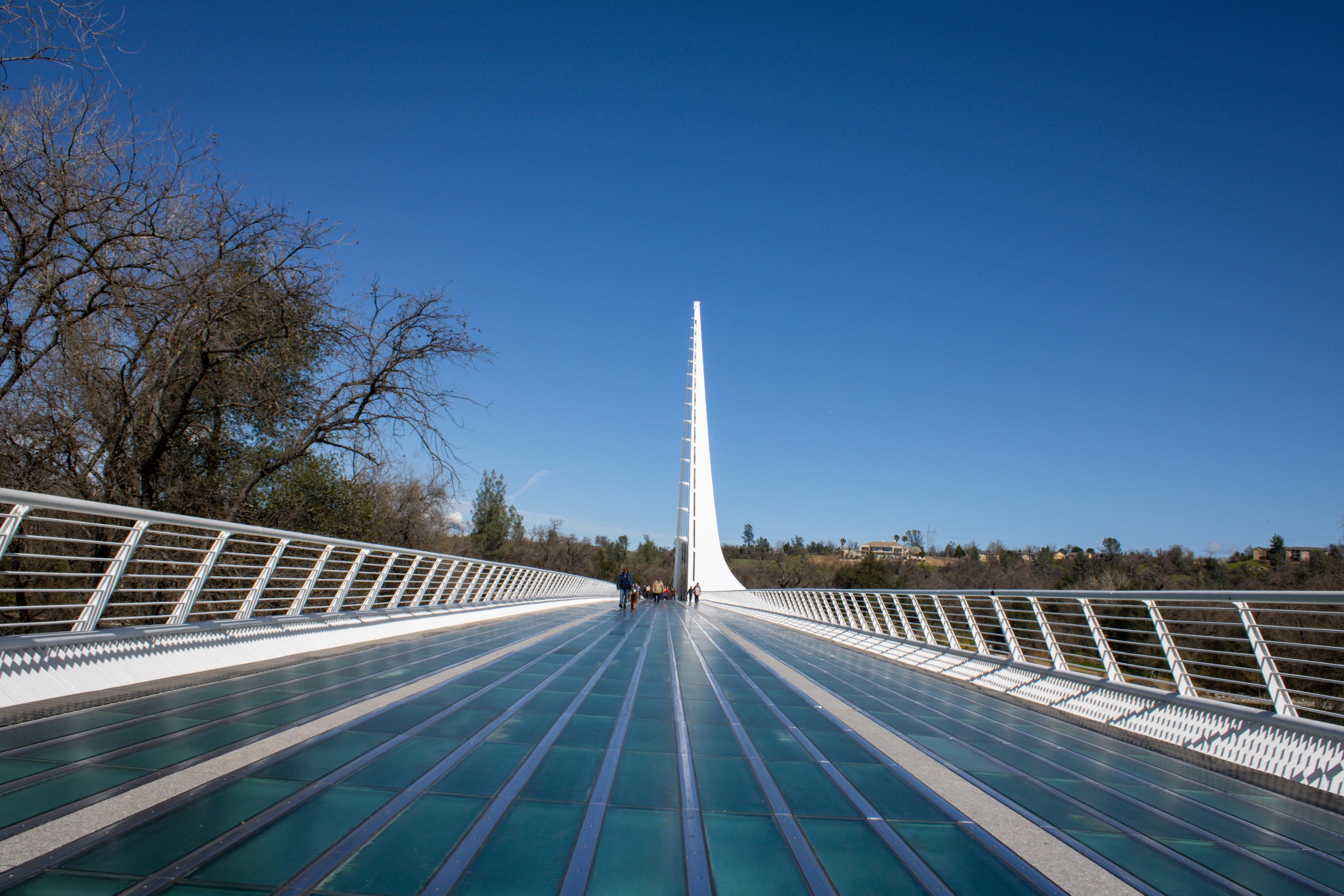Redding and the Density Divide
As a Bay Area native, Redding is an interesting place. Crossing over the freeway overpasses you see the surrounding mountains, and it’s beautiful. It was my second visit, and while the city has its warts (as all do), it also exudes a rustic, forgotten charm. I understand why my family finds its vicinity to nature appealing. Redding is “out of the way from everything,” and many find that peaceful. Driving home, snowcapped Mount Shasta dominated the rear-view mirror, and we had views of prominent Lassen Peak to the left. Both were splendent; there are no mountains like that in the South Bay.
Sundial Bridge in the heart of Redding
The pace of life is different in Redding. While going to the grocery store and driving around it was clear people move slowly. They worry less about getting somewhere, and overall seem less tense—there’s less association with time. We walked around our Airbnb neighborhood, and it felt different. Every fourth or fifth house had a large Trump sign or banner somewhere in the front yard, something you don’t see in Santa Clara. “We’re not in Kansas anymore,” I thought to myself…
People who live in the city and those who live in the countryside face a large experiential divide. It was the largest demarcation between the original colonies and early states: economies, living conditions, and lifestyle were all different. People in the city enjoy the hustle and bustle. They appreciate the vast number of food choices, all the entertainment options. People in the country enjoy the connection with nature, appreciate the peace in being left alone, and like what’s familiar.
There’s an inherent element of self-reliance among rural people; if you can’t take care of yourself, you fail. In old times, it meant you didn’t survive. They pride themselves on their ability to thrive on their own. City dwellers rely on services more. Traditionally there’s no space to raise animals or crops, to grow your own food. They specialize in something that adds a piece of value to the societal whole. That specialized value converts into currency, which they use to fill out the rest of their lives, outsourcing much that country folk engage in daily. City folk are specialists, rural folk are generalists.
The remains of Whiskeytown in Shasta County
I think this is one of the prime distinctions in American life and thus America politics. The ‘swing states,’ those that actually determine elections, have a mix of both lifestyles. Ohio, Pennsylvania, Michigan and Wisconsin have larger, liberal cities, but also many conservatives across large swaths of rural land. These states hold a balance between the specialization and services and the generalism and self reliance. Those two lived experiences differ greatly, and their proponents tend to vote very differently.
This divide seems to directly stem from the density of land, the density of living. When you’re forced to be self reliant due to lack of services, you need many skills just for daily life. That makes you more accustomed to the familiar, because you’re the one that has to solve your problems. The fewer surprises the better. Meanwhile urbanites are constantly affronted with change. They must continuously adapt to novel situations, and this leads to more openness, more acceptance of a variety of experience. They are regularly exposed to what they can’t control, and regularly utilize services that resolve problems. Driving across town in the City is a pain, so San Franciscans take public transit or ride shares.
This difference in density is one of the fundamental causes of liberalism and conservatism. People often cite wealth and the reluctance around taxes, but that’s only one part of the story. The wealthy avoid high taxes whether they live in Atherton or Russian Hill. “Ordinary” people living in cities don’t want to pay taxes any more than those in rural areas, they just value services above solitude.
Whiskeytown National Recreation Area in early Spring, 2021
And yet, these differences are still small compared to the larger picture. We might go about our days differently, but we still live the same days: 24 hours at a time, seeking health, wealth, prosperity and peace for our tribe. We may have varying tolerance for taxes, rely on services to a different degree, but we still all want the same things. Our methods are simply different. Our pursuit of meaning, the means to which we pursue meaning, still resemble one singular human path. Our children still go to school. None of us want cancer or dementia or heart disease. We all want our children to live long, healthy excellent lives. We all want freedom. Are we really any different?
Leaning into the divide between metropolitans and farmers is not the answer. The answer is to recognize the liberal-conservative divide for what it actually is: tiny variation within the woven fabric of humanity.
Redding is not that far from me. I woke up and did my Morning Routine, like always. I went to get bagels. My wife and I sat and had breakfast and coffee. We packed. Then we left to drive up there. Four hours later, we were in a very different, very beautiful place. I felt myself sticking out at the gas stations and grocery stores wearing traditional Silicon Valley garb: dress shorts and a short sleeve button up, complete with Xero Sandals and an Apple Watch with a LGBT rainbow wristband. And yet, nobody cared. The locals in Redding were nothing but nice. Am I that different from them? We’re all trying to make our way in life.
That’s our purpose in our short time here, to figure life out. And in my experience, whether in Redding or Silicon Valley, China or South Africa, it’s much better to do that together.




